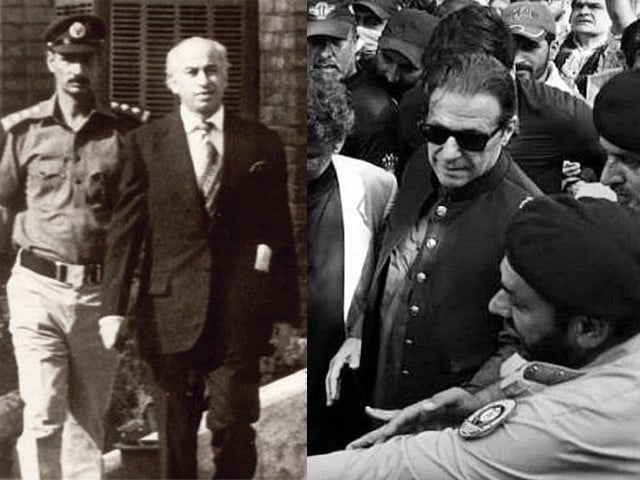
A Case of Fair Trials: Zulfikar Ali Bhutto and Imran Khan
By Asma Bangash
Pakistan

In recent news, the Supreme Court of Pakistan has declared that former Prime Minister Zulfikar Ali Bhutto (ZAB) had not received a fair trial, a verdict that comes almost half a century later. While this is great news for the veracity of our justice system, there is a feeling of justice delayed is justice denied. But as they also say, better late than never.
Ironically enough, we saw footages of PPP Chairman Bilawal Bhutto Zardari ‘teary eyed’. While as a lawyer or an international law expert, I am all for the dispensation of justice and rule of law; here are my two questions, one for the honorable Chief Justice of Pakistan and the other for the PPP chairman.
While the honorable Chief Justice is declaring that a fair trial was not given to ZAB, I want to ask our justice system what is being done differently today by the judges or the courts, 44 years later? What is different now from 1979? In today’s reference, my question pertains to what is being done to one of Pakistan’s most popular and largest political party’s leader, Imran Khan? Isn’t history repeating itself in today’s courts? Is Imran Khan being given a fair trial?
What is being done right now will also pass and become part of our history but will keep haunting generations and Pakistan’s wounded soul for years. If we review the legal proceedings against Imran, Shah Mehmood Qureshi, and other political workers of PTI, we find a flagrant disregard for the basic principles of justice, due process and the procedural safeguards in their trials. The denial of access of their trials to the public or media and the prohibition of cross-examination of prosecution witnesses are flagrant violations of rights, including the right to a fair trial and the presumption of innocent until proven guilty as enshrined in the Constitution of Pakistan as well as international law.
In 2010, Article 10-A (the right to fair trial and due process) was inserted in the Constitution via the 18th Amendment, making it a basic constitutional right of every citizen of Pakistan. Interestingly enough, while the 1973 Constitution of Pakistan had incorporated most of fundamental human rights, the right to fair trial was omitted, and looking at the situation in Pakistan, I realize that it was rightly left out since it was never meant to be respected or guaranteed. Nevertheless, it is part of the Constitution of Pakistan.
Moreover, although the Constitution itself does not define the right, a reference to international human rights conventions can help us understand what it may entail, which is:
“A fair and public hearing, by an independent and impartial tribunal, within a reasonable time; announcement of the judgement in open court, presumption of innocence of the accused until proven guilty beyond reasonable doubt; availability of safeguards to a person charged with a criminal offence, including the right to be informed of the charge against him, right to have adequate time and facilities to prepare his defense, right to be defended through counsel of his choice, right to produce witnesses or have witnesses summoned and examined.”
Coming to Imran’s trials, the lack of transparency and impartiality in the conduct of these trials is casting a dark shadow over the rule of law and the dispensation of justice in Pakistan. We must not forget, justice must not only be done, but it must also be seen to be done, which is not the case here. Such practices are not only undermining the credibility of the legal and justice system of Pakistan but also violating the principles of justice and fairness as enshrined in the international human rights law also.
My second question is for Bilawal. Today you are siding with people who are carrying out the same injustice to Imran as they did to your grandfather? How come you are teary eyed today? Every time I see injustice in the world, my mind goes back to what our beloved Prophet’s (PBUH) grandson Imam Hussain (AS) had said: “Those who are silent while others are oppressed are guilty of oppression themselves”.
To Bilawal Bhutto, I say, you can’t shed tears for the injustice against your grandfather and shake hands with the people carrying out the same injustice to another. There is no place for neutrality when it comes to justice. When you remain neutral while witnessing injustice, you have chosen the side of the oppressor.
It is time we realize our past mistakes, learn from them and not repeat them. Because otherwise, after another 44 years, another chief justice would be sitting calling your verdicts illegal and another grandson would be crying over the injustices done to his grandfather.
( Asma Bangash is a peace activist and a law graduate from Khyber Law College, Peshawar. The Express Tribune)

